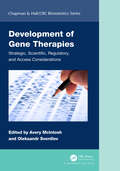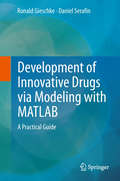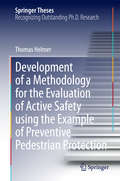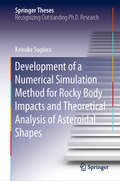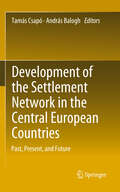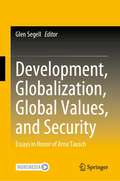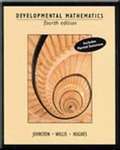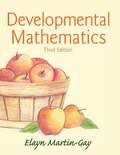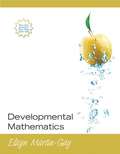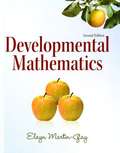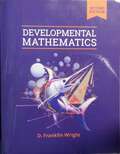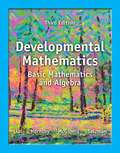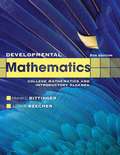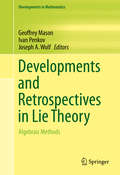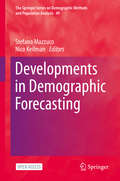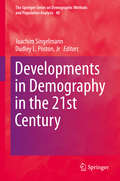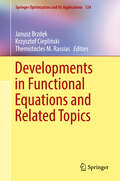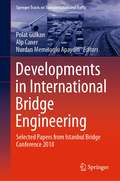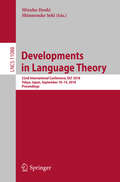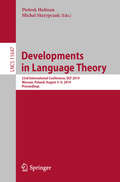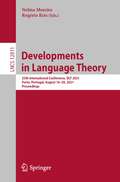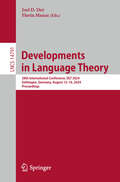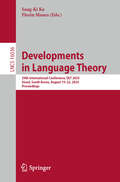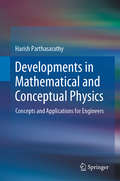- Table View
- List View
Development of Gene Therapies: Strategic, Scientific, Regulatory, and Access Considerations (Chapman & Hall/CRC Biostatistics Series)
by Oleksandr Sverdlov Avery McIntoshCell and gene therapies have become the third major drug modality in pharmaceutical medicine of the 21st century after low molecular weight and antibody drugs. The gene therapy (GTx) field is rapidly advancing, and yet there are still fundamental scientific questions that remain to be answered. Development of GTx products poses unique challenges and opportunities for drug developers. However, there is lack of a systematic exposition of the GTx product development and the pivotal role of the biostatistician in this process. Development of Gene Therapies: Strategic, Scientific, and Regulatory, and Access Considerations attempts to summarize the current state-of-the-art strategic, scientific, statistical, and regulatory aspects of GTx development. Intended to provide an exposition to the GTx new product development through peer-reviewed papers written by subject matter experts in this emerging field, this book will be useful for researchers in gene therapy drug development, biostatisticians, regulators, patient advocates, graduate students, and the finance and business development community . Key Features: A collection of papers covering a wide spectrum of topics in gene therapies (GTx), written by leading subject matter experts. An exposition of the core principles of GTx product development, emerging business models, industry standards, best practices, and regulatory pathways. An exposition of statistical and innovative modeling tools for design and analysis of clinical trials of GTx. Insights into commercial models, access hurdles, and health economics of gene therapies. Case studies of successful GTx approvals from core team members that developed the first two FDA-approved AAV gene therapies: Luxturna and Zolgensma. A discussion of potential benefits and hurdles to be overcome for GTx in coming years from a multi-stakeholder perspective.
Development of Innovative Drugs via Modeling with MATLAB
by Ronald Gieschke Daniel SerafinThe development of innovative drugs is becoming more difficult while relying on empirical approaches. This inspired all major pharmaceutical companies to pursue alternative model-based paradigms. The key question is: How to find innovative compounds and, subsequently, appropriate dosage regimens? Written from the industry perspective and based on many years of experience, this book offers: - Concepts for creation of drug-disease models, introduced and supplemented with extensive MATLAB programs - Guidance for exploration and modification of these programs to enhance the understanding of key principles - Usage of differential equations to pharmacokinetic, pharmacodynamic and (patho-) physiologic problems thereby acknowledging their dynamic nature - A range of topics from single exponential decay to adaptive dosing, from single subject exploration to clinical trial simulation, and from empirical to mechanistic disease modeling. Students with an undergraduate mathematical background or equivalent education, interest in life sciences and skills in a high-level programming language such as MATLAB, are encouraged to engage in model-based pharmaceutical research and development.
Development of a Methodology for the Evaluation of Active Safety using the Example of Preventive Pedestrian Protection
by Thomas HelmerThe book reports on a new methodology for optimization and evaluation of traffic safety, which simulates the processes involved in traffic conflicts on the basis of detailed dynamical, human, and technical models. The models incorporate the whole spectrum of human cognitive functions and responses, the responses of an active safety system and the interactions between the human and the system as they occur in a sample of relevant traffic contexts. Using the developed method, the author was able to assess the reduction in accidents and injuries as well as the possible side effects resulting from a preventive pedestrian-protection system. The book provides practical solutions in the area of active safety systems. It represents an interesting source of information for researchers and professionals as well as all stakeholders, including policy makers and consumer advocates, with the common goal of promoting the implementation and adoption of highly efficient systems for preventing accidents and injuries.
Development of a Numerical Simulation Method for Rocky Body Impacts and Theoretical Analysis of Asteroidal Shapes (Springer Theses)
by Keisuke SugiuraThis book describes numerical simulations of collisions between asteroids, based on a unique numerical code developed by the author. The code accurately solves the elastic dynamic equations and describes the effects of fracture and friction, which makes it possible to investigate the shapes of impact outcomes produced by asteroid collisions and subsequent gravitational accumulation of fragments.The author parallelizes the code with high parallelization efficiency; accordingly, it can be used to conduct high-resolution simulations with the aid of supercomputers and clarify the shapes of small remnants produced through the catastrophic destruction of asteroids. The author demonstrates that flat asteroids can only be produced by impacts involving objects with similar mass and low velocity, which suggests that the flat asteroids in our solar system were created in the planet formation era and have kept their shapes until today. The author also shows that asteroid collisions under certain conditions can produce the extremely elongated shape of an interstellar minor body, 1I/‘Oumuamua. In brief, the book offers a comprehensive investigation of asteroid impacts and shapes, making it a uniquely valuable resource.
Development of the Settlement Network in the Central European Countries
by András Balogh Tamás CsapóThis volume intends to summarize the most important changes in the Central European countries and their settlement network emphasizing the last 20 years since the collapse of the Iron Curtain.
Development, Globalization, Global Values, and Security: Essays in Honor of Arno Tausch
by Glen SegellThis book, written in honor of Arno Tausch, presents cutting-edge research on globalization, development, and global values. Internationally renowned authors cover topics such as global economic and political cycles, global values, and support for terrorism. Over the last five decades, the Austrian political scientist Arno Tausch was a pioneer in studies on globalization, development and global values. This collection of essays takes up the issues dealt with by Tausch and presents perspectives for the 21st Century. Throughout his work, Tausch applied quantitative methods to study the fundamental issues of the global political economy and the global political system, like dependency, economic and political cycles, and global values, based on a rigorous study of available social scientific data, like the World Values Survey and the Arab Barometer.
Developmental Mathematics
by C. L. Johnston Alden T. Willis Gale M. HughesThis traditional, straight-forward, extremely popular book is noted for its one-step, one-concept-at-a-time approach. In the new edition, the authors have brought in new coverage to meet NCTM standards where appropriate.
Developmental Mathematics
by Elayn Martin-GayElayn Martin-Gay's developmental math program is motivated by her firm belief that every student can succeed. Martin-Gay's focus on the student shapes her clear, accessible writing, inspires her constant pedagogical innovations, and contributes to the popularity and effectiveness of her video resources. This revision of Martin-Gay's algebra series continues her focus on students and what they need to be successful. This program provides a better teaching and learning experience, for you and your students. Here's how: The new Martin-Gay Student Success Program provides an integrated teaching and learning system--combining the textbook, MyMathLab®, student and video organizers, and the video program--which is designed to help students gain the math and study skills they need for success in developmental math and beyond.
Developmental Mathematics
by K. Elayn Martin-GayDevelopmental Mathematics is a new addition to the Martin-Gay work text series and is intended for a 2-3 semester sequence of Basic Math,Introductory Algebra and Intermediate Algebra. The text provides complete coverage for basic mathematics and introductory algebra courses and with the appendices ("further topics in algebra") it provides the necessary intermediate algebra topics. The Whole Numbers; Multiplying and Dividing Fractions; Adding and Subtracting Fractions; Decimals; Per¢ Geometry; Statistics and Probability; Real Numbers and Introduction to Algebra; Equations, Inequalities, and Problem Solving; Graphing Equations and Inequalities; Systems of Linear Equations; Exponents and Polynomials; Factoring Polynomials; Rational Expressions; Roots and Radicals; Quadratic Equations and Nonlinear Graphs; Further Algebraic Topics; Tables; The Bigger Picture; Further Geometric Topics; Inductive and Deductive Reasoning; Sample THEA Test For all readers interested in developmental mathematics.
Developmental Mathematics (Second Edition)
by Elayn Martin-GayElayn Martin-Gay firmly believes that every student can succeed, and her developmental math textbooks and video resources are motivated by this belief. Developmental Mathematics, Second Edition was written to help readers effectively make the transition from arithmetic to algebra. The new edition offers new resources like the Student Organizer and now includes Student Resources in the back of the book to help students on their quest for success.
Developmental Mathematics 2e Textbook And Software Bundle
by Hawkes LearningDevelopmental Mathematics 2e Textbook
Developmental Mathematics: Basic Mathematics And Algebra
by Margaret L. Lial John Hornsby Stanley Salzman Diana Hestwood Terry McGinnisThe Lial Series has helped thousands of students succeed in developmental mathematics by providing the best learning and teaching support to students and instructors.
Developmental Mathematics: College Mathematics and Introductory Algebra (8th Edition)
by Marvin L. Bittinger Judith A. BeecherThe Bittinger series changed the face of developmental education with the introduction of objective-based work texts that presented math one concept at a time. This approach allowed readers to understand the rationale behind each concept before practicing the associated skills and then moving on to the next topic. With this revision, Marv Bittinger continues to focus on building success through conceptual understanding, while also supporting readers with quality applications, exercises, and new review and study materials to help students apply and retain their knowledge.
Developments and Retrospectives in Lie Theory
by Ivan Penkov Geoffrey Mason Joseph A. WolfThe Lie Theory Workshop, founded by Joe Wolf (UC, Berkeley), has been running for over two decades. At the beginning, the top universities in California and Utah hosted the meetings, which continue to run on a quarterly basis. Experts in representation theory/Lie theory from various parts of the US, Europe, Asia (China, Japan, Singapore, Russia), Canada, and South and Central America were routinely invited to give talks at these meetings. Nowadays, the workshops are also hosted at universities in Louisiana, Virginia, and Oklahoma. These Lie theory workshops have been sponsored by the NSF, noting the talks have been seminal in describing new perspectives in the field covering broad areas of current research. The contributors have all participated in these Lie theory workshops and include in this volume expository articles which will cover representation theory from the algebraic, geometric, analytic, and topological perspectives with also important connections to math physics. These survey articles, review and update the prominent seminal series of workshops in representation/Lie theory mentioned above, and reflects the widespread influence of those workshops in such areas as harmonic analysis, representation theory, differential geometry, algebraic geometry, number theory, and mathematical physics. Many of the contributors have had prominent roles in both the classical and modern developments of Lie theory and its applications.
Developments in Demographic Forecasting (The Springer Series on Demographic Methods and Population Analysis #49)
by Nico Keilman Stefano MazzucoThis open access book presents new developments in the field of demographic forecasting, covering both mortality, fertility and migration. For each component emerging methods to forecast them are presented. Moreover, instruments for forecasting evaluation are provided. Bayesian models, nonparametric models, cohort approaches, elicitation of expert opinion, evaluation of probabilistic forecasts are some of the topics covered in the book. In addition, the book is accompanied by complementary material on the web allowing readers to practice with some of the ideas exposed in the book. Readers are encouraged to use this material to apply the new methods to their own data. The book is an important read for demographers, applied statisticians, as well as other social scientists interested or active in the field of population forecasting. Professional population forecasters in statistical agencies will find useful new ideas in various chapters.
Developments in Demography in the 21st Century (The Springer Series on Demographic Methods and Population Analysis #48)
by Dudley L. Poston Joachim SingelmannThis book introduces demographic applications which employ current demographic concepts and theories and cutting-edge methods and findings, all of which have and will continue to have an impact in the broad area of social demography. Through providing an introduction to new and current developments in demography, methodological and statistical issues, data issues, issues of health, aging and mortality, and issues in social demography, this book gives new insights into data, substantive issues, and methodological approaches that will assist readers in their use of demography in their research. At the same time it shows demographers, sociologists, economists, statisticians, methodologists, planners, and marketers how they may learn and improve upon the quality and relevance of their demographic investigations now and in the future.
Developments in Functional Equations and Related Topics (Springer Optimization and Its Applications #124)
by Janusz Brzdęk, Krzysztof Ciepliński and Themistocles M. RassiasThis book presents current research on Ulam stability for functional equations and inequalities. Contributions from renowned scientists emphasize fundamental and new results, methods and techniques. Detailed examples are given to theories to further understanding at the graduate level for students in mathematics, physics, and engineering.Key topics covered in this book include:Quasi meansApproximate isometriesFunctional equations in hypergroupsStability of functional equationsFischer-Muszély equationHaar meager sets and Haar null setsDynamical systemsFunctional equations in probability theoryStochastic convex orderingDhombres functional equationNonstandard analysis and Ulam stabilityThis book is dedicated in memory of Staniłsaw Marcin Ulam, who posed the fundamental problem concerning approximate homomorphisms of groups in 1940; which has provided the stimulus for studies in the stability of functional equations and inequalities.
Developments in International Bridge Engineering: Selected Papers from Istanbul Bridge Conference 2018 (Springer Tracts on Transportation and Traffic #17)
by Alp Caner Polat Gülkan Nurdan Memisoglu ApaydinThis book reports on current challenges in bridge engineering faced by professionals around the globe, giving a special emphasis to recently developed techniques and methods for bridge design, construction and monitoring. Based on extended and revised papers selected from outstanding presentation at the Istanbul Bridge Conference 2018, held from November 5 – 6, 2018, in Istanbul, Turkey, and by highlighting major bridge studies, spanning from numerical and modeling studies to the applications of new construction techniques and monitoring systems, this book is intended to promote high standards in modern bridge engineering. It offers a timely reference to both academics and professionals in this field.
Developments in Language Theory: 22nd International Conference, DLT 2018, Tokyo, Japan, September 10-14, 2018, Proceedings (Lecture Notes in Computer Science #11088)
by Mizuho Hoshi Shinnosuke SekiThis book constitutes the proceedings of the 22nd International Conference on Developments in Language Theory, DLT 2018, held in Tokyo, Japan, in September 2018. The 39 full papers presented in this volume were carefully reviewed and selected from 84 submissions. The papers cover the following topics and areas: combinatorial and algebraic properties of words and languages; grammars, acceptors and transducers for strings, trees, graphics, arrays; algebraic theories for automata and languages; codes; efficient text algorithms; symbolic dynamics; decision problems; relationships to complexity theory and logic; picture description and analysis, polyominoes and bidimensional patterns; cryptography; concurrency; celluar automata; bio-inspired computing; quantum computing.
Developments in Language Theory: 23rd International Conference, DLT 2019, Warsaw, Poland, August 5–9, 2019, Proceedings (Lecture Notes in Computer Science #11647)
by Michał Skrzypczak Piotrek HofmanThis book constitutes the proceedings of the 23rd International Conference on Developments in Language Theory, DLT 2019, held in Warsaw, Poland, in August 2019. The 20 full papers presented together with three invited talks were carefully reviewed and selected from 30 submissions. The papers cover the following topics and areas: combinatorial and algebraic properties of words and languages; grammars, acceptors and transducers for strings, trees, graphics, arrays; algebraic theories for automata and languages; codes; efficient text algorithms; symbolic dynamics; decision problems; relationships to complexity theory and logic; picture description and analysis, polyominoes and bidimensional patterns; cryptography; concurrency; celluar automata; bio-inspired computing; quantum computing.
Developments in Language Theory: 25th International Conference, DLT 2021, Porto, Portugal, August 16–20, 2021, Proceedings (Lecture Notes in Computer Science #12811)
by Nelma Moreira Rogério ReisThis book constitutes the proceedings of the 25th International Conference on Developments in Language Theory, DLT 2021, which was held in Porto, Portugal, during August 16-20, 2021. The conference took place in an hybrid format with both in-person and online participation.The 27 full papers included in these proceedings were carefully reviewed and selected from 48 submissions. The DLT conference series provides a forum for presenting current developments in formal languages and automata. Its scope is very general and includes, among others, the following topics and areas: grammars, acceptors and transducers for words, trees and graphs; algebraic theories of automata; algorithmic, combinatorial, and algebraic properties of words and languages; variable length codes; symbolic dynamics; cellular automata; polyominoes and multidimensional patterns; decidability questions; image manipulation and compression; efficient text algorithms; relationships to cryptography, concurrency, complexity theory, and logic; bio-inspired computing; quantum computing. The book also includes 3 invited talks in full paper length.
Developments in Language Theory: 28th International Conference, DLT 2024, Göttingen, Germany, August 12–16, 2024, Proceedings (Lecture Notes in Computer Science #14791)
by Florin Manea Joel D. DayThis book constitutes the refereed proceedings of the 28th International Conference on Developments in Language Theory, DLT 2024, held in Göttingen, Germany, during August 12–16, 2024. The 17 full papers and 4 invited papers included in this book were carefully reviewed and selected from 26 submissions. They presented current developments in formal languages and automata. The scope is very general and includes, among others, the following topics and areas: grammars, acceptors and transducers for words; trees and graphs; relations between formal languages and artificial neural networks; algebraic theories of automata; algorithmic, combinatorial, and algebraic properties of words and languages; variable length codes; symbolic dynamics; cellular automata; groups and semigroups generated by automata; polyominoes and multidimensional patterns; decidability questions; image manipulation and compression; efficient text algorithms; relationships to cryptography, concurrency, complexity theory, and logic; bio-inspired computing; and quantum computing.
Developments in Language Theory: 29th International Conference, DLT 2025, Seoul, South Korea, August 19–22, 2025, Proceedings (Lecture Notes in Computer Science #16036)
by Florin Manea Sang-Ki KoThis LNCS conference volume constitutes the proceedings of the29th International Conference on Developments in Language Theory, DLT 2025, in Seoul, South Korea, in August 2025. The 18 full papers and 2 invited papers included in this book were carefully reviewed and selected from 38 submissions. They presented current developments in formal languages and automata. Its scope is very general and includes, among others, the following topics and areas: grammars, acceptors and trans-ducers for words, trees and graphs; algebraic theories of automata; algorithmic and many more.
Developments in Mathematical and Conceptual Physics: Concepts and Applications for Engineers
by Harish ParthasarathyThis book presents concepts of theoretical physics with engineering applications. The topics are of an intense mathematical nature involving tools like probability and random processes, ordinary and partial differential equations, linear algebra and infinite-dimensional operator theory, perturbation theory, stochastic differential equations, and Riemannian geometry. These mathematical tools have been applied to study problems in mechanics, fluid dynamics, quantum mechanics and quantum field theory, nonlinear dynamical systems, general relativity, cosmology, and electrodynamics. A particularly interesting topic of research interest developed in this book is the design of quantum unitary gates of large size using the Feynman diagrammatic approach to quantum field theory. Through this book, the reader will be able to observe how basic physics can revolutionize technology and also how diverse branches of mathematical physics like large deviation theory, quantum field theory, general relativity, and electrodynamics have many common issues that provide the starting point for unifying the whole of physics, namely in the formulation of Grand Unified Theories (GUTS).
